ABOUT
OUR FOCUS
Development and application of innovative techniques for biomarker in human diseases.
We believe that utilizing molecular imaging tools we can uncover abnormalities in cell metabolism and assess treatment efficacy.
OUR APPROACH
Combining principles from bioengineering, chemistry, and physics, we tackle biological challenges through innovative solutions. Application of Magnetic Resonance (MR) molecular imaging methods to investigate biochemical pathways and in vitro, in vivo and in innovative in bioengineered chip systems.

OUR METHODS
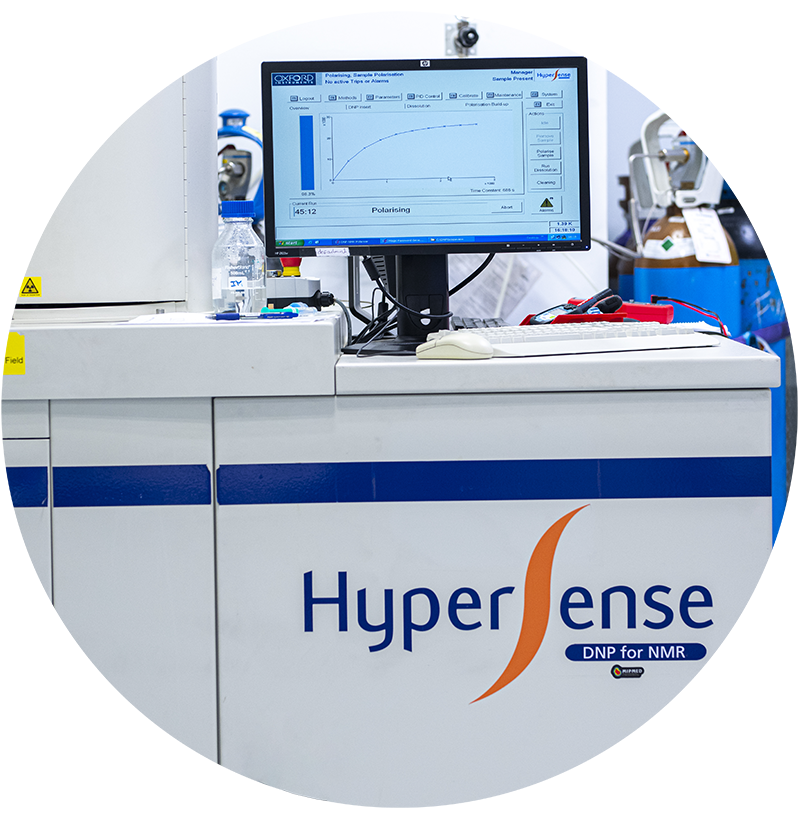
Hyperpolarised NMR (HP-NMR)
At the forefront of molecular imaging, our team specializes in hyperpolarized MR techniques, which amplify NMR signals over 10,000 times. This advancement allows real-time, non-invasive observation of molecular processes within a broad spectrum of biological systems, offering unprecedented insights into dynamic biological phenomena in real time. In our group we work with two HP methods: dissolution Dynamic nuclear polarization (dDDNP) and Parahydrogen Induced Polarization (PHIP).
Magnetic Resonance (MR) Imaging
Building upon the established clinical utility of MR imaging (MRI) for non-destructive tissue analysis, our work extends to MR spectroscopic imaging, which offers chemical specificity. This enables direct correlation between chemical compounds and biological events across various biological samples, including biofluids, cells, tissues, animal models, and clinical patients.
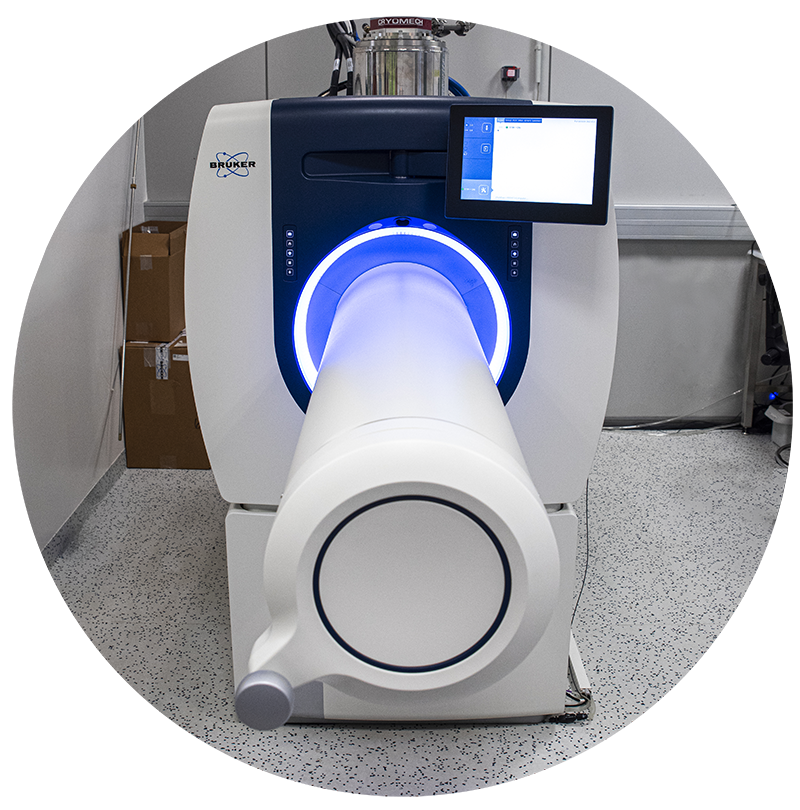
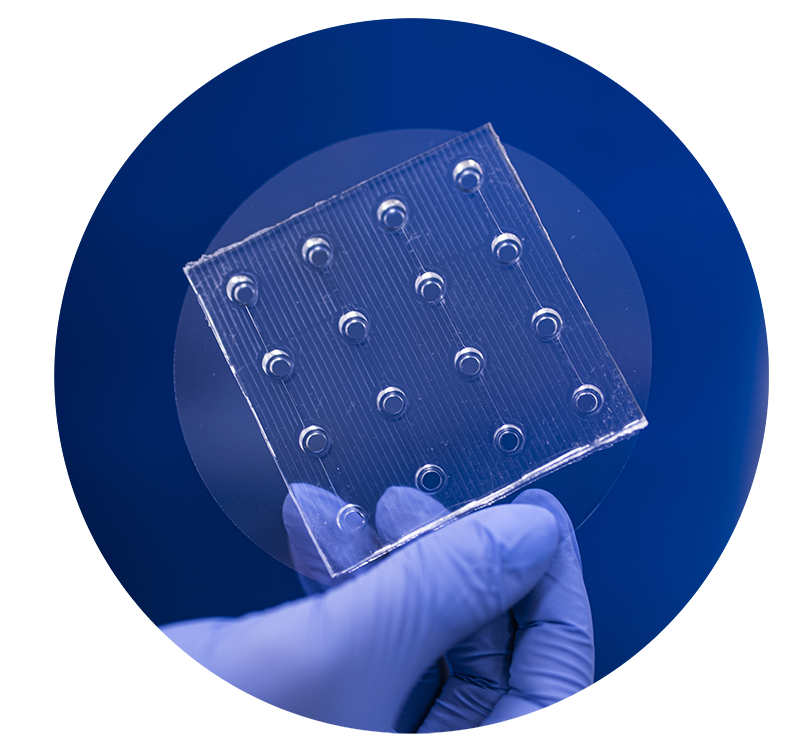
Microfluidic platforms
Microfluidic platforms, especially lab-on-a-chip devices, are revolutionizing the study of metabolism in disease by offering a compact and efficient means to analyze biological samples. These chips integrate intricate networks of microchannels and chambers, allowing for precise control and manipulation of small fluid volumes. A significant advantage of these platforms is their ability to accommodate multiple samples simultaneously for a single measurement, such as Magnetic Resonance Imaging (MRI). This unique design not only enhances throughput and reduces sample consumption but also enables high-resolution and multiplexed metabolic analysis. Consequently, microfluidic chips are becoming indispensable tools in biomedical research, providing valuable insights into disease mechanisms and facilitating the identification of metabolic biomarkers.
Metabolomics
Metabolomics is the comprehensive study of metabolites, the small molecules involved in metabolic processes within a biological system. Analysis of metabolites using NMR spectroscopy reveals insights into the biochemical activities occurring in cells, tissues, or organisms. This field is particularly useful for biomarker identification associated with particular diseases. Identifying these biomarkers can improve disease diagnosis, prognosis, and the development of personalized treatment strategies.
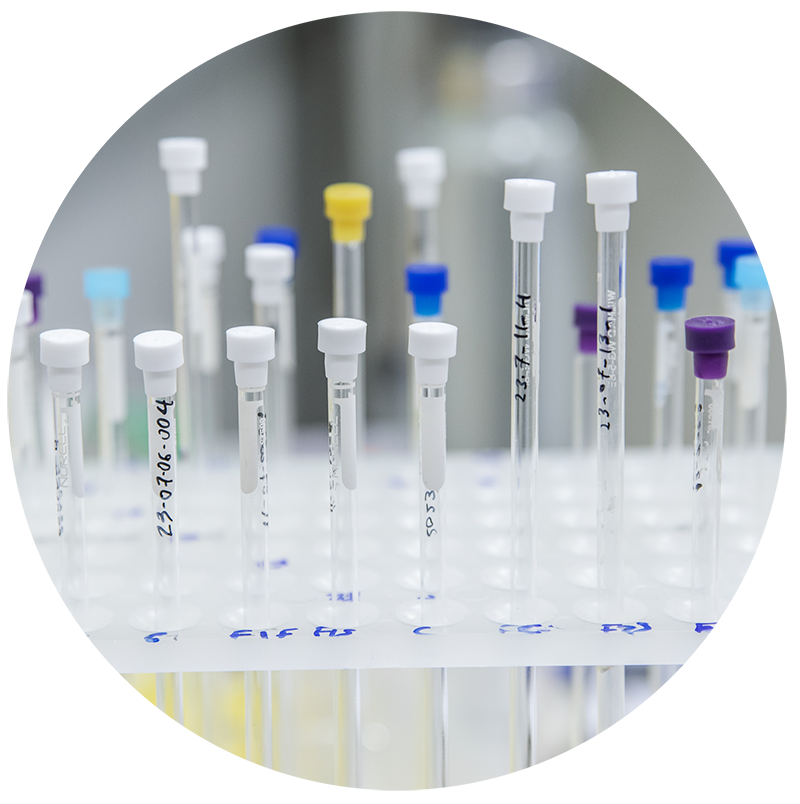
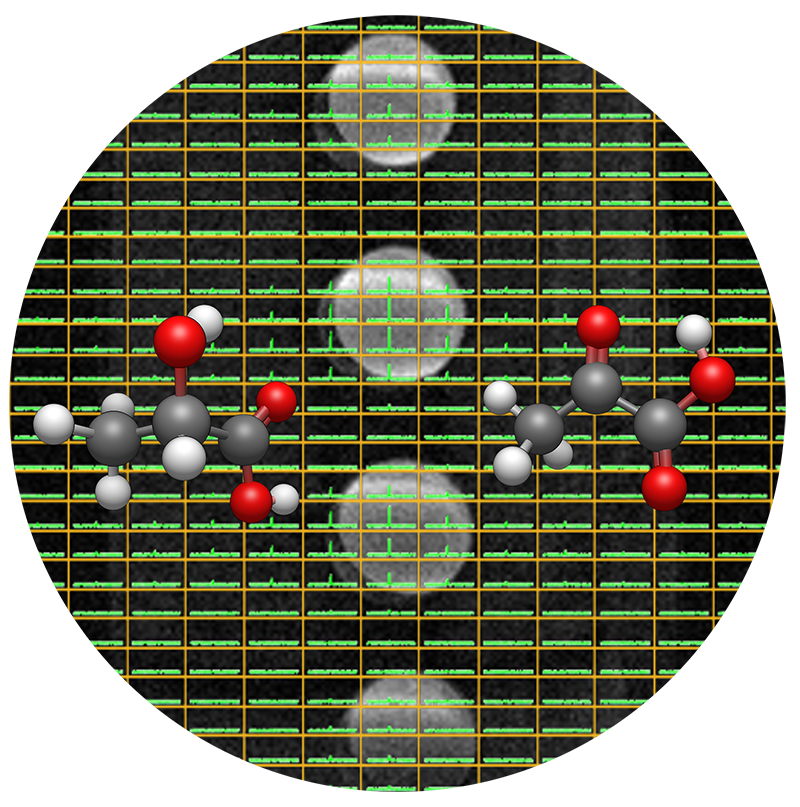
Computer Modelling of biological systems
By using the law of mass action, it is possible to model different cellular processes in a deterministic manner, and hence, describe these systems at a population level. These models can describe a wide range of processes, from gene expression and regulation to enzyme kinetics and particles movements thanks to membrane transporters.
STAFF
All group members:
PROJECTS
| INTERNATIONAL PROJETCS | FINANCER | PI |
|---|---|---|
| BLOC · Benchtop NMR for Lab-on-Chip (2020 – 2022) | European Commission, FET OPEN | Irene Marco |
| NATIONAL PROJECTS | FINANCER | PI |
|---|---|---|
| Analisis metabolico en tiempo real de modelos de cultivo de celulas 3d de la enfermedad del higado graso no alcoholico: organos en un chip y resonancia magnetica nuclear (2020 – 2021) | MINECO, Acciones Dinamización Europa Investigación/EIN2020-112209 | Irene Marco |
| Junior Leader Programe (2018 – 2022) | Obra Social La Caixa, Junior Leader Program | Irene Marco |
PUBLICATIONS
For a list of publications prior to joining IBEC, visit the Google Scholar.
Check for more detailed information on the outputs of the Group at IBEC CRIS portal.
Publications list:
NEWS

Fundación «la Caixa»: Diálogos entre Irene Marco y Llucia Ramis
Irene Marco fue becada por la Fundación ”la Caixa” en dos ocasiones. La primera, para cursar un máster en Biofísica en la Universidad de Heidelberg (Alemania). La segunda, para desarrollar su investigación posdoctoral en Biología Molecular y Bioquímica en el IBEC. Esta es su historia contada a la periodista y escritora Llucia Ramis.
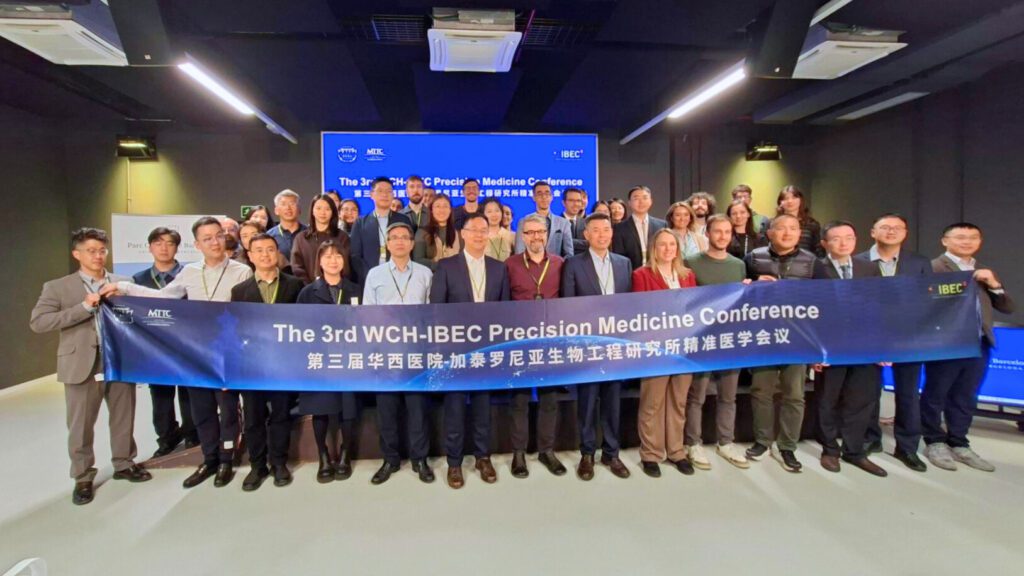
El IBEC y el Hospital West China celebran en Barcelona su tercera Conferencia conjunta de Medicina de Precisión
Esta semana ha tenido lugar en Barcelona la tercera Conferencia de Medicina de Precisión IBEC-WCH, un encuentro que consolidó la alianza estratégica entre el Instituto de Bioingeniería de Cataluña (IBEC) y el Hospital West China de la Universidad de Sichuan (WCHSU). La delegación china visitó España del 26 al 29 de noviembre, participando en un programa intensivo de actividades científicas, institucionales y de intercambio entre ambos centros.
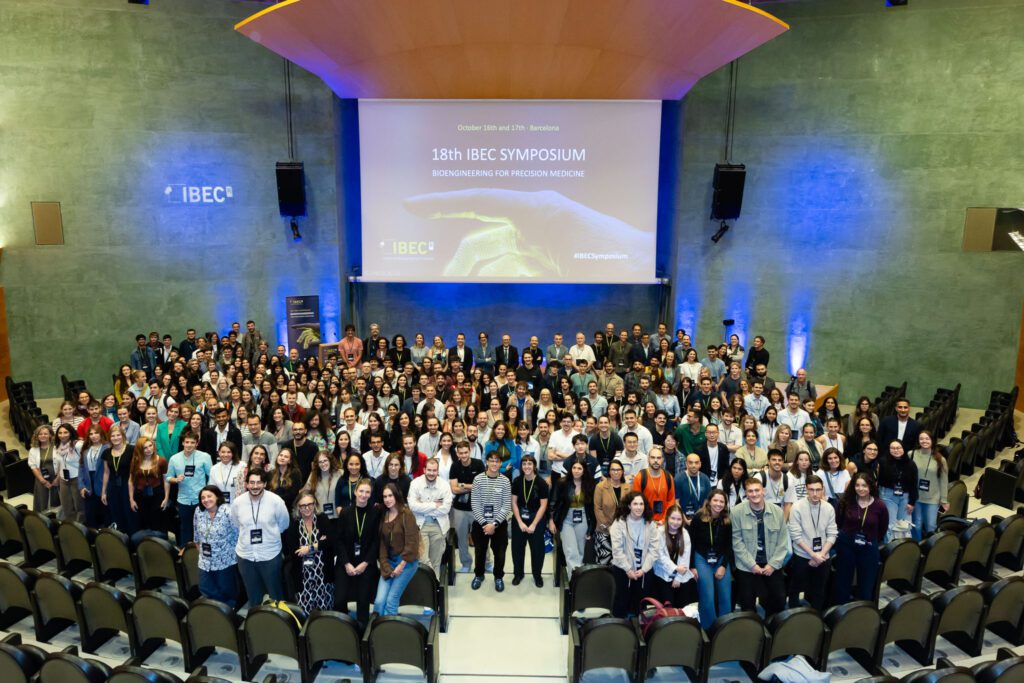
Bioingeniería para la medicina de precisión en el 18º Simposio del IBEC
El 18º Simposio anual del IBEC se centró en ‘Bioingeniería para la Medicina de Precisión’, una de las áreas clave de aplicación del IBEC. Fueron cerca de 300 las personas asistentes al evento, entre las que se encontraba personal investigador local e internacional. Un ambiente multidisciplinar en el que expertos y expertas de otros centros y la propia comunidad del IBEC tuvieron la oportunidad de presentar sus proyectos e intercambiar conocimiento.
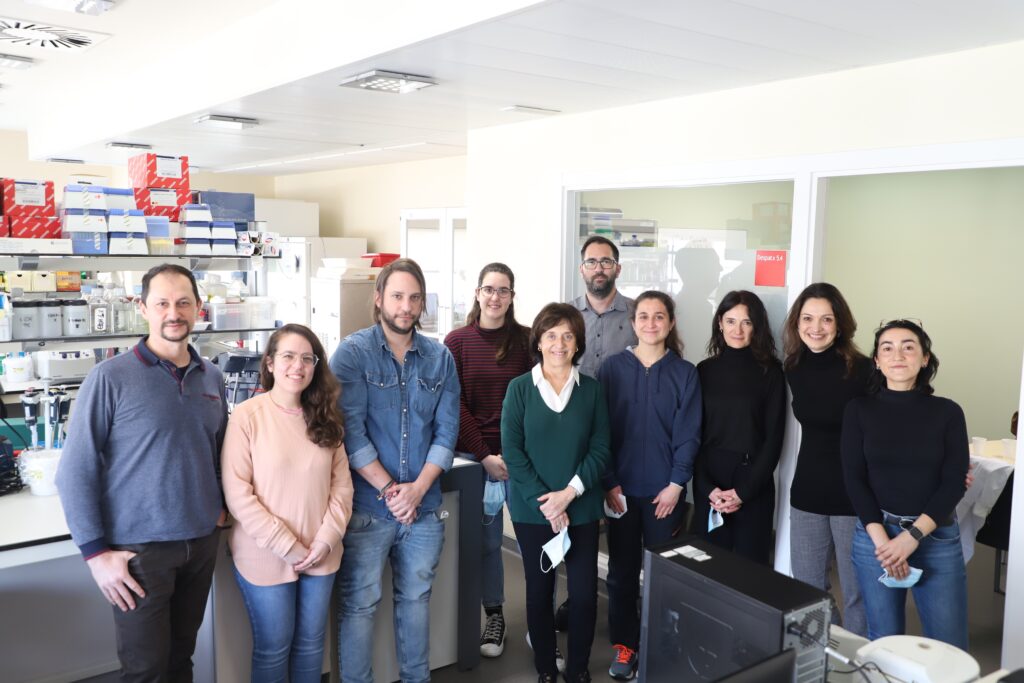
Las dietas ricas en grasa alteran de forma distinta los genes en machos y hembras
Un estudio liderado por el área de Diabetes y Enfermedades Metabólicas Asociadas del CIBER (CIBERDEM) en colaboración con el instituto de Bioingeniería de Cataluña (IBEC) ha demostrado que las dietas ricas en grasas modifican, de forma distinta en función del sexo, la expresión de genes en tejidos clave para el control metabólico. Estos resultados aportan una nueva perspectiva sobre cómo la obesidad impacta de forma distinta en función del sexo.
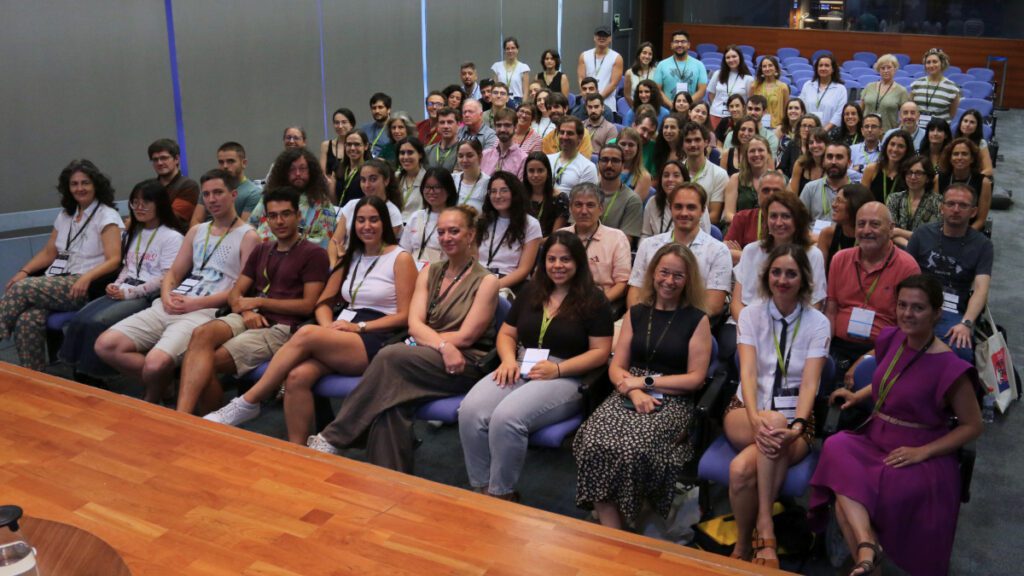
El IBEC acoge el 5º Congreso Anual del Capítulo Ibérico de la ISMRM
Los días 3 y 4 de julio se celebró en Barcelona el 5º Congreso Anual del Capítulo Ibérico de la Sociedad Internacional de Resonancia Magnética en Medicina (ISMRM Iberian Chapter), organizado este año en colaboración con el Instituto de Bioingeniería de Catalunya (IBEC). El evento reunió a cerca de un centenar de personas relacionadas con el ámbito de la resonancia magnética para debatir los últimos avances científicos, clínicos y computacionales en el campo.

La investigadora del IBEC Irene Marco Rius recibe el Premio Anatole Abragam por sus contribuciones al campo de la resonancia magnética
La Dra. Irene Marco Rius, investigadora principal del Instituto de Bioingeniería de Cataluña (IBEC), ha sido galardonada con el Premio Anatole Abragam 2025 por su trabajo pionero en el uso de la resonancia magnética para estudiar células cultivadas en chips, lo que permite la evaluación metabólica ex vivo de los mecanismos de la enfermedad y las respuestas terapéuticas en microambientes controlados. El premio fue entregado en la Conferencia Conjunta ENC-ISMAR en California.

El IBEC y el ICMS se reencuentran en Eindhoven para celebrar su Simposio Anual en colaboración
Hoy, 24 de marzo, se ha celebrado el simposio conjunto ICMS-IBEC-MPIP. Un evento coorganizado por el Instituto de Bioingeniería de Cataluña (IBEC), el Instituto de Sistemas Moleculares Complejos (ICMS) y el Instituto Max Planck de Investigación en Polímeros (MPIP). Durante la jornada, investigadores de los tres centros han compartido sus áreas de investigación, buscando fortalecer los lazos científicos entre las instituciones.
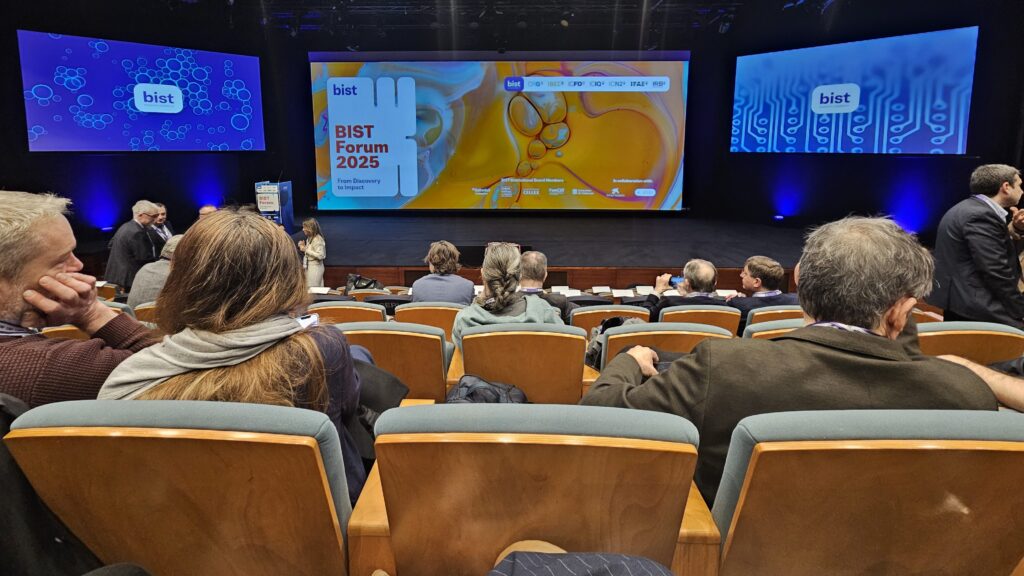
El IBEC destaca en el BIST Forum con 4 proyectos BIST Ignite y un BIST Ignite Award
Hoy se ha celebrado el BIST Forum, un evento que reúne a la comunidad científica del BIST y que este año se ha centrado en la iniciativa conjunta de los siete centros CERCA para impulsar la medicina de precisión en el envejecimiento saludable. Durante el acto, se han anunciado los nuevos proyectos BIST Ignite para fomentar la investigación multidisciplinar, con la participación del IBEC en cuatro de los cinco seleccionados. Además, uno de los proyectos con participación del IBEC ha sido galardonado con un BIST Ignite Award.
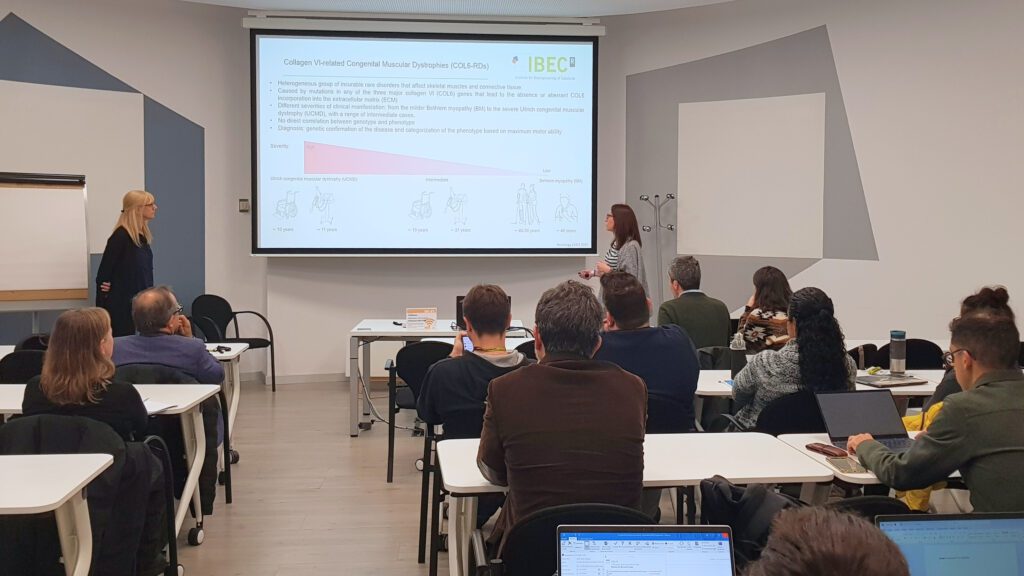
El IBEC y el Hospital Sant Joan de Déu refuerzan su colaboración con una jornada de innovación traslacional
El Instituto de Bioingeniería de Cataluña y el Hospital Sant Joan de Déu han celebrado una jornada conjunta para impulsar colaboraciones en bioingeniería y medicina traslacional. El evento, realizado esta mañana en el IBEC, puso de relieve proyectos innovadores, presentó un programa de doctorado conjunto y fomentó el intercambio de ideas entre investigadores de ambas instituciones.
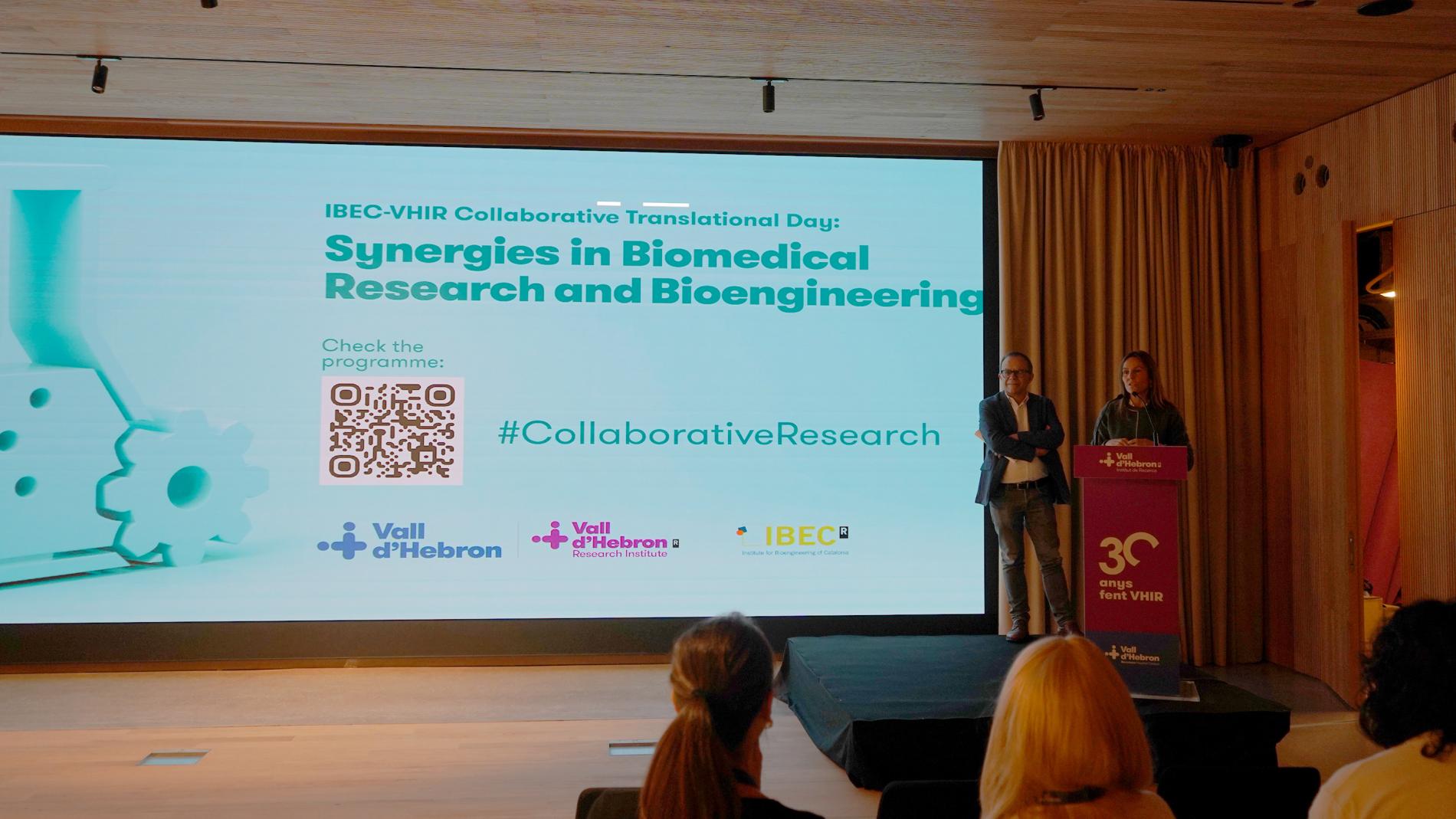
El IBEC y el VHIR celebran una jornada de colaboración para fomentar las sinergias
La 1ª Jornada Colaborativa Traslacional entre el Vall d’Hebron Instituto de Investigación (VHIR) y el Instituto de Bioingeniería de Cataluña (IBEC), celebrada el 21 de noviembre, ha sido una oportunidad para conocer proyectos y líneas de investigación de ambas instituciones y promover la interacción entre los profesionales.
JOBS
Researcher in Training – Quantum-Enhanced & AI-Driven Metabolic Imaging
Ref: RT-IM // Deadline: 21/12/2025
Postdoctoral Researcher at the Molecular Imaging for Precision Medicine Research Group
Ref: PD-IM // Deadline: 27/10/2025
Biologist/postdoctoral researcher in MRI at the Research Group Molecular Imaging for Precision Medicine
Ref: PR-IM // Deadline: 31/07/2025
Engineer/postdoctoral researcher in NMR at the Research Group Molecular Imaging for Precision Medicine
Ref: PR-IM // Deadline: 31/08/2025
PhD candidate at the Research Group Molecular Imaging for Precision Medicine in Barcelona
Ref: PhD- IM // Deadline: 25/04/2025
Lab Technician at the Research Group Molecular Imaging for Precision Medicine in Barcelona
Ref: LT-IM // Deadline: 16/03/2025
Lab Technician at the Research Group Molecular Imaging for Precision Medicine in Barcelona
Ref:LT-IM //Deadline: 19/02/2025


 ibecbarcelona.eu
ibecbarcelona.eu